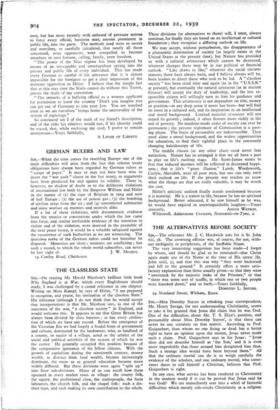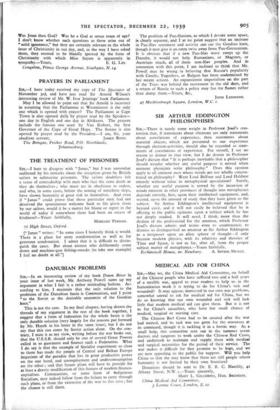THE ALTERNATIVES BEFORE SOCIETY
Sitt,—The reference Mr. J. C. Hardwick asks for is St. John viii, 58. The crowning offence was, of course, the use, with- out ambiguity or periphrasis, of the Ineffable Name.
The very interesting suggestion has been made—I forget by whom, and should be glad to be reminded—that Christ again made use of the Name at the time of His arrest (St. John xviii, 5), and that this was why " they went backward and fell to the ground." It certainly offers a more satis- factory explanation than those usually given—as that they were " awestruck by the majestic looks of the Prisoner," or that " there was some sort of scuffle, in which one or two people were knocked down," and so forth.—Yours faithfully,
SIR, Miss Dorothy Sayers in rebuking your correspondent, Mr. Henry Savage, for not understanding Christianity, seems to take it for granted that Jesus did claim that he was God. One of the difficulties about Mr. T. S. Eliot's position, and presumably about Miss Dorothy Sayers', is that there can never be any certainty on that matter. According to Prof. Guignebert, than whom no one living or dead has a better right to have an opinion upon the matter, Jesus never made such a claim. Prof. Guignebert says in his Jesus: " Jesus then did not describe himself as ' the Son,' and it is even more improbable that those around him designated him thus. Such a strange idea would have been beyond them." All that the ordinary mortal can do is to weigh carefully the evidence of the scholars, and one ordinary mortal, who some- times dares to call himself a Christian, believes that Prof. Guignebert is right.
In any case, what service has been rendered to Christianity in the modern world if it can be proved that Jesus said he was God? We are immediately sent into a whirl of fantastic difficulties which merely side-tracks Christianity as a religion.
Was Jesus then God? Was he a God at seven years of age? I don't know whether such questions as these arise out of " solid ignorance," but they are certainly relevant to the whole issue of Christianity in our day, and, in the way I have asked them, they seemed to be blandly ignored by the form of Christianity with which Miss Sayers is apparently in





































 Previous page
Previous page